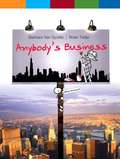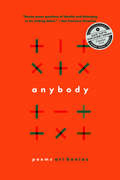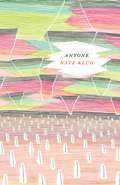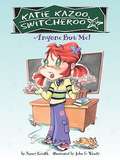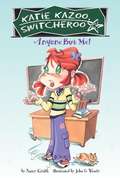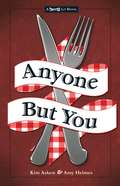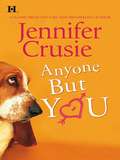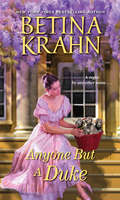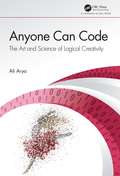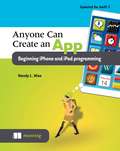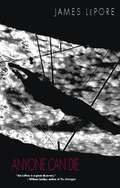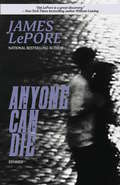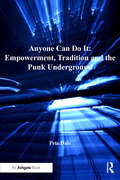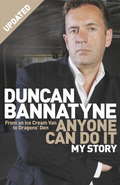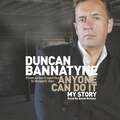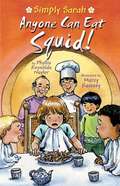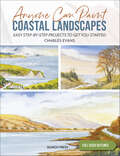- Table View
- List View
Anybody at Home?
by H. A. ReyThe short verses in Anybody at Home? ask children to identify various homes and the animals and objects that live there
Anybody's Business
by Barbara Van Syckle Brian TietjeMore than a book, Anybody's Business is an approach to business and life that harnesses the best of people and how they work together to produce a transformation in perspective and purpose. This text shows the students the connections between business concepts and their everyday lives. The skills they learn can be put to use from the moment they leave the classroom and throughout their professional journey.
Anybody's Guide To Total Fitness
by Leonard KravitzAnybody’s Guide to Total Fitness, eleventh edition, by Len Kravitz combines the most up-to-date scientific and practical information for establishing an optimal health, fitness and wellness lifestyle. The text offers instruction on how to customize exercise programs for high intensity interval training, indoor cycling, aerobic kickboxing, circuit training, biomotor functional exercise conditioning, boot camp training, barefoot running and aquatic workouts. The book comes with a behavioral modification planner and assessment supplement that promotes positive, self-directed goal attainment.
Anybody's Guide to Total Fitness Student Profile Guide
by Len KravitzAnybody’s Guide to Total Fitness Student Profile Guide(11th Edition) by Len Kravitz
Anybody: Poems
by Ari Banias"Ari Banias is one of the best living poets, and this book in your hands is our proof. Anybody is the courage of a poet who trusts the strength of poetry to make room in our world for everybody." --CAConrad In Anybody, Ari Banias takes up questions of recognition and belonging: how boundaries are drawn and managed, the ways he and she, us and them, here and elsewhere are kept separate, and at what cost identities and selves are forged. Moving through iconic and imagined landscapes, Anybody confronts the strangeness of being alive and of being a restlessly gendered, queer, emotive body. Wherever the poet turns--the cruising spaces of Fire Island, a city lake, a Greek island, a bodega-turned-coffee-shop--he finds the charge of boundedness and signification, the implications of what it means to be a this instead of a that. Witty, tender, and original, these poems pierce the constructs that define our lives.
Anybody’s Bike Book
by Jon ScovilleThis is a book about fixing bicycles. It is written in such a way that anyone can use it to fix any bicycle. Many of you (especially the ladies) have been given the idea that if something is mechanical, you can't do it. That is outrageous. Bicycles are not monstrous machines which only wizards can understand. They are all simple enough that with a little know-how and patience, anyone can work on them. You can do it! You don't have to know any magic. The mechanical mystique is a lie.
Anyone
by Nate KlugMilton’s God Where I-95 meets The Pike, a ponderous thunderhead flowered-- stewed a minute, then flipped like a flash card, tattered edges crinkling in, linings so dark with excessive bright that, standing, waiting, at the overpass edge, the onlooker couldn’t decide until the end, or even then, what was revealed and what had been hidden. Using a variety of forms and achieving a range of musical effects, Nate Klug’s Anyone traces the unraveling of astonishment upon small scenes--natural and domestic, political and religious--across America’s East and Midwest. The book’s title foregrounds the anonymity it seeks through several means: first, through close observation (a concrete saw, a goshawk, a bicyclist); and, second, via translation (satires from Horace and Catullus, and excerpts from Virgil’s Aeneid). Uniquely among contemporary poetry volumes, Anyone demonstrates fluency in the paradoxes of a religious existence: "To stand sometime / outside my faith . . . or keep waiting / to be claimed in it. ” Engaged with theology and the classics but never abstruse, all the while the poems remain grounded in the phenomenal, physical world of "what it is to feel: / moods, half moods, / swarming, then darting loose. ”
Anyone But Me #1
by Nancy E. KrulikKatie Carew, nicknamed Katie Kazoo by the class bully, had no idea what would happen when she wished that she could be anyone but herself. But now her wish has come true, and-switcheroo!-she keeps turning into other people and even animals! What is one ordinary third-grade girl with a really extraordinary problem to do? It's a good thing Katie is resourceful and smart enough to find a solution for every problem . . . no matter how much of a disaster she causes! Katie can't stand George, the class bully. He constantly picks on everyone, but he really torments Katie. One day, she can't stand it anymore, and she wishes she could be anyone but herself. What she doesn't see is the shooting star that flashes through the sky at that moment . . . catapulting Katie into a crazy series of adventures, starting the next day when she turns into the class hamster! Will she be trapped in a glass cage forever? Will she ever be a girl again? .
Anyone But Me (Katie Kazoo Switcheroo #1)
by Nancy KrulikKatie Carew is fed up. Everything keeps going wrong. If only she could be anyone but herself! But Katie has to be careful what she wishes for...it just might come true! In this story, Katie turns into a hamster. Very cute. She has problems with a classroom bully and the way this problem is resolved is great. Fun facts about hamsters can be found at the end of the book.
Anyone But You
by Amy Helmes Kim AskewThese violent delights have violent ends... Gigi Caputo is fed up. A vicious act of vandalism has dealt another blow to her family's proud pizza heritage, and the Montes--owners of a rival Italian restaurant--are clearly to blame. The hostility goes far beyond bragging rights for best pizza in Chicago. The Montes have been bent on destroying Cap's for four generations. Even if it means putting herself in harm's way, Gigi's determined to get to the bottom of the feud. Instead, in a secret encounter with Roman Monte, the very boy whose relatives have brought her family such grief, she finds both danger and love at first sight. If the daughter and son of these two warring families fall for each other, can it be anything but a recipe for disaster? Slowly, Gigi and Roman learn that their story is fatefully linked to the summer of 1933, when two twelve-year-olds, Benny and Nick, hop the turnstile at the Chicago World's Fair. The most stunning wonder of the fair is Stella, who innocently causes a lasting rift between the two boyhood. Wending its way through past and present day, this modern take on Shakespeare's Romeo and Juliet is bittersweet, funny, and intensely exciting. It's classic romance--a tale of hate and the only force that can ever defeat it: love.
Anyone But You
by Jennifer CrusiePart basset, part beagle, all Cupid...For Nina Askew, turning forty means freedom--from the ex-husband, freedom from their stuffy suburban home, freedom to focus on what she wants for a change. And what she wants is something her ex always vetoed--a puppy. A bouncy, adorable puppy.Instead she gets...Fred.Overweight, middle-aged, a bit smelly and obviously depressed, Fred is light-years from perky. But he does manage to put Nina in the path of Alex Moore, her gorgeous, younger-by-a-decade neighbor.Alex seems perfect--he's a sexy, seemingly sane, surprisingly single E.R. doctor--but the age gap convinces Nina that anyone but Alex would be better relationship material. But with every silver-haired stiff she dates, the more she suspects it's the young, dog-loving doc she wants to sit and stay!
Anyone But You: 6 Best-Friend's-Sibling Romances
by Synithia Williams Kathryn Brocato Christy Mckellen Elley Arden Ruby Lang Christine S FeldmanBrotherly love may be off limits between BFFs, but these six couples risk family and friends to find their happily ever after.Clean Breaks: Sarah Soon’s brush with cancer shook this usually confident OB/GYN. Jake Li, her brother’s annoying high school best friend who betrayed her trust, is the last person she wants to see, but the now disturbingly hot social worker has begun hanging around. Newly divorced Jake knows he shouldn’t look for a serious relationship already, but he’s always been helplessly drawn to Sarah’s vivaciousness. Can he show her that he’s worthy of a second chance? Her New Worst Enemy: To save her BFF from marrying the wrong man, Ellie will do anything, even suck up to her brother’s best mate, commitment-phobic playboy Gideon DeLancy, to persuade him to hold an intervention at his Georgian manor. Gideon doesn’t intend to fall for his friend’s snarky sister, and he sure as hell doesn’t expect their weekend to develop into a full-on sex-fest. A torrid weekend affair should be the easiest thing in the world to walk away from, so why are they finding it so difficult? From One Night to Forever: Trucker Aaron Henderson rolls into Resilient, Tennessee, for business, but an unexpected one-night stand turns out to be his new partner’s baby sister. When Kacey Randal learns her brother’s new business partner has a list of conquests as high as his big rig’s mileage, she’s ready to pretend their night together never happened. Can Aaron prove to Kacey he’s ready to reform his roaming ways? The Texas Takedown: Berry Challoner arrives in Houston determined to go undercover as a secretary to solve her brother’s murder. Surely Tyler Reid, his best friend and a certified public accountant, can help her follow the money to the killer. But Tyler’s not a fan of this crazy, spontaneous plan, even if he is mesmerized by Berry. When it looks like she’s next on the killer’s list, he’ll have to go all in to save the girl who’s beginning to capture his heart. Baby by Design: Tony Corcarelli forged his own path as the family’s black sheep, but now his dying Nonna is shamelessly pressuring him to choose between two paths he can’t fathom: a wife and kids or the priesthood. Trish DeVign is a successful interior designer, single by choice and satisfied … except for that ticking biological clock. When Trish asks her best friend’s brother, Tony, to escort her to a wedding, a night of fun and flirtation turns serious, with Trish confessing she wants a baby. Could a calculated conception be the answer they’ve both been looking for? Coming Home: Callie Sorenson’s first love was tall, tanned, and, as her older brother’s best friend, completely taboo. But now a twist of fate brings her back from New York City to the childhood home she left behind years ago, and to hometown boy Danny McCutcheon. Callie is not the young girl he remembers—as a woman, she’s turning his world upside down. The risk to their hearts is high, but the temptation may just prove to be too much to resist. Sensuality Level: Sensual
Anyone But You: The Third in the Twisted Lit Series
by Kim AskewThese violent delights have violent ends...Gigi Caputo is fed up. A vicious act of vandalism has dealt another blow to her family's proud pizza heritage, and the Montes--owners of a rival Italian restaurant--are clearly to blame. The hostility goes far beyond bragging rights for best pizza in Chicago. The Montes have been bent on destroying Cap's for four generations. Even if it means putting herself in harm's way, Gigi's determined to get to the bottom of the feud. Instead, in a secret encounter with Roman Monte, the very boy whose relatives have brought her family such grief, she finds both danger and love at first sight. If the daughter and son of these two warring families fall for each other, can it be anything but a recipe for disaster? Slowly, Gigi and Roman learn that their story is fatefully linked to the summer of 1933, when two twelve-year-olds, Benny and Nick, hop the turnstile at the Chicago World's Fair. The most stunning wonder of the fair is Stella, who innocently causes a lasting rift between the two boyhood. Wending its way through past and present day, this modern take on Shakespeare's Romeo and Juliet is bittersweet, funny, and intensely exciting. It's classic romance--a tale of hate and the only force that can ever defeat it: love.
Anyone But a Duke (Sin & Sensibility #3)
by Betina KrahnNew York Times bestselling author Betina Krahn delivers an irresistible romance shimmering with light-hearted wit and thrilling twists . . . The youngest of four spirited American sisters, Sarah Bumgarten has studiously avoided her mother’s attempts to find her a titled husband among London’s aristocracy. Now, after an earl’s very public rejection, it seems her ideal mate will be anyone but a duke, a marquis, a baron, or a viscount . . . Thankfully, there are no noblemen in sight at Betancourt, the country estate where Sarah takes refuge. Its rightful owner, the Duke of Meridian, sibling to Sarah’s brother-in-law, has been absent for years. Accompanied by her bevy of beloved animals, Sarah delights in refurbishing the once-grand property. But even a self-assured frontier heiress needs help when greedy tenants are threatened by her presence . . . Out of nowhere, a stranger jumps into the fray when ruffians attack. Nothing about “Art,” the roguish interloper—now recuperating in the ducal bedchamber—smacks of nobility, with his brazen sensuality, worldly knowledge, and deeply seductive voice. Yet could he be the errant duke? If so, Sarah soon realizes this homecoming promises to be filled with unexpected challenges and passionate possibilities . . .
Anyone But a Fortune (The Fortunes of Texas: The Wedding Gift #3)
by Judy DuarteIt doesn&’t matter if you win or lose—unless you&’re competing against a Fortune in USA TODAY bestselling author Judy Duarte's contribution to The Fortunes of Texas: The Wedding Gift! &“You say my name like it&’s a dirty word.&” Self-made woman Sofia De Leon has heard enough about the old money Fortune family to know that Beau Fortune is not to be trusted. He might be tall, dark, handsome and rich, but he&’s so not her type. And now that they are competing for the same business award, he is also her rival. It is just a hot Texas minute, though, before ambition begins warring with attraction…From Harlequin Special Edition: Believe in love. Overcome obstacles. Find happiness.The Fortunes of Texas: The Wedding GiftBook 1: Their New Year's Beginning by Michelle MajorBook 2: A Soldier's Dare by Jo McNallyBook 3: Anyone But a Fortune by Judy DuarteBook 4: Cinderella Next Door by Nancy Robards ThompsonBook 5: A Fortune in the Family by Kathy DouglassBook 6: Finding Fortune's Secret by Allison Leigh
Anyone Can Code: The Art and Science of Logical Creativity
by Ali Arya"Ali Arya guides you in a fantastic journey full of creativity in a coherent way that allows the traveler to learn and build up over the knowledge acquired in previous chapters until the reader accomplishes skills to develop solutions using programming." — Andrés A. Navarro Newball, Professor, Pontificia Universidad Javeriana, Cali, Colombia "An excellent book that teaches programming and software development the way it should be done: independent from a specific implementation language and focusing on the main principles that are fundamental and substantive to any kind of software production." — Marc Conrad, Principal Lecturer, University of Bedfordshire, Luton, UK Anyone Can Code: The Art and Science of Logical Creativity introduces computer programming as a way of problem-solving through logical thinking. It uses the notion of modularization as a central lens through which we can make sense of many software concepts. This book takes the reader through fundamental concepts in programming by illustrating them in three different and distinct languages: C/C++, Python, and Javascript. Key features: Focuses on problem-solving and algorithmic thinking instead of programming functions, syntax, and libraries Includes engaging examples, including video games and visual effects Provides exercises and reflective questions This book gives beginner and intermediate learners a strong understanding of what they are doing so that they can do it better and with any other tool or language that they may end up using later. Author Ali Arya is an Associate Professor in the School of Information Technology at Carleton University, Ottawa, Canada. He received his PhD in Computer Engineering from the University of British Columbia, Vancouver, Canada, in 2003. He has over 25 years of experience in professional and academic positions related to software development and information technology. He is passionate about computer programming that brings together logical and creative abilities.
Anyone Can Create an App: Beginning iPhone and iPad programming
by Wendy WiseSummaryDo you have a fantastic idea for an iPhone app but no idea how to bring it to life? Great news! With the right tools and a little practice, anyone can create an app. This book will get you started, even if you've never written a line of computer code.Purchase of the print book includes a free eBook in PDF, Kindle, and ePub formats from Manning Publications.About the BookAnyone Can Create an App begins with the basics by introducing programming concepts, the Swift language, and the tools you'll need to write iOS apps. As you explore the interesting examples, illuminating illustrations, and crystal-clear step-by-step instructions, you'll learn to:Get started programming, no experience necessary!Add controls like text boxes and buttonsKeep track of your favorite things by creating the Like It or Not (LioN) appBy the end, you'll be able to create and run your own apps, and you'll have the confidence to learn more on your own. The book is updated for Swift 3.About the ReaderThis book is written especially for non programmers - no experience needed!About the AuthorWendy Wise has an extensive background in mobile and application development and has worked with several Fortune 500 companies. In her 17-year technical career, Wendy has served as a senior director of software development, a senior product manager for international mobile applications, and a hands-on developer for web and mobile technologies, among many other technical roles. Wendy fully embraces her nerd/geek side, as you'll find out as you read this book. In her spare time, she enjoys beer, coffee, photography, camping, and being outdoors.Table of ContentsPART 1 - YOUR VERY FIRST APPGetting startedBuilding your first appYour first app, explainedLearning more about your development tools: XcodeCapturing users' actions: adding buttonsThe button app, explainedCapturing user input: adding text boxesPlaying on the PlaygroundPART 2 - THE KEYS TO THE CITY: UNDERSTANDING KEY DEVELOPMENT CONCEPTSGo with the flow, man! Controlling the flow of your appWhile you're doing that... CollectionsTelling stories with storyboardsViewControllers in depth Put it on my tab: creating tab barsTable views: more than a coffee table picture bookPatterns: learning to sewPART 3 - CREATING THE LIKE IT OR NOT APP Putting it all together: the LioN appAdding data to your LioN appDisplaying details of your LioNCreating the details of the detail viewThe AddEditView sceneDelegates are everywhereEditing LioNsSaving LioNsMaking your LioN prettierWorking with Auto LayoutSearch your LioNs
Anyone Can Die
by James LeporeJames LePore's first novel, A World I Never Made earned raves from reviewers, readers, and fellow authors alike. Blogcritics called it, "An outstanding first novel, and a wonderful thriller." Bella Online said, "I highly recommend this compelling suspense story filled with vivid characters and haunting storylines. A story that will stay with the reader long after the final pages." And M.J. Rose, the acclaimed author of The Memorist said A World I Never Made was, "A compelling page-turner - one of those wonderful books with characters as strong as the story and a story worth reading. Don't miss it."Now LePore returns to the characters of A World I Never Made to present us with three suspenseful and unforgettable stories:Till Death Do Us Part: A young Pat Nolan and his wife are on their honeymoon in New Mexico when they find a bond they did not know they had as they are forced to confront trouble in the form of a surly trio of locals.God's Warriors: Megan Nolan, a cynical American woman on her own in Europe makes a life-changing decision that both reveals and belies her true character.Max: Max French, a quirky, deadly and, in his own eyes, oddly lovable FBI agent faces a personal drama that will set the course of his future.
Anyone Can Die
by James LeporeA thrilling and suspenseful collection of stories from a modern thriller master. James LePore has been called "a great discovery" by New York Times bestselling author William Landay, and his work has been praised as "compelling," "remarkable," and "un-put-down-able." In ANYONE CAN DIE, he presents us with six stunning stories of suspense featuring the characters of two of his national bestsellers, A WORLD I NEVER MADE and BLOOD OF MY BROTHER. Here, you'll meet a honeymooning couple forced to confront trouble, a quirky - and deadly - FBI agent, a tough guy with a penchant for justice, a woman with secrets too dangerous to share, and more jump-off-the-page characters with haunting stories. In addition, each story is illustrated with one of the author's mesmerizing, distinctive photographs. Electrifying, thought-provoking, and consistently captivating, ANYONE CAN DIE is a bracing reading experience.
Anyone Can Do It: Empowerment Tradition And The Punk Underground (Ashgate Popular and Folk Music Series)
by Pete DaleFor more than three decades, a punk underground has repeatedly insisted that 'anyone can do it'. This underground punk movement has evolved via several micro-traditions, each offering distinct and novel presentations of what punk is, isn't, or should be. Underlying all these punk micro-traditions is a politics of empowerment that claims to be anarchistic in character, in the sense that it is contingent upon a spontaneous will to liberty (anyone can do it - in theory). How valid, though, is punk's faith in anarchistic empowerment? Exploring theories from Derrida and Marx, Anyone Can Do It: Empowerment, Tradition and the Punk Underground examines the cultural history and politics of punk. In its political resistance, punk bears an ideological relationship to the folk movement, but punk's faith in novelty and spontaneous liberty distinguish it from folk: where punk's traditions, from the 1970s onwards, have tended to search for an anarchistic 'new-sense', folk singers have more often been socialist/Marxist traditionalists, especially during the 1950s and 60s. Detailed case studies show the continuities and differences between four micro-traditions of punk: anarcho-punk, cutie/'C86', riot grrrl and math rock, thus surveying UK and US punk-related scenes of the 1980s, 1990s and beyond.
Anyone Can Do It: My Story
by Duncan BannatyneAt 30, Duncan Bannatyne had no money and was enjoying life on the beaches of Jersey. He saw a story of someone who had made himself a millionaire, and decided to do the same. Five years later he had done it, and now he is worth £168 million. <P><P>In this remarkable book, Bannatyne relives his colourful path to riches, from ice cream salesman to multi-millionaire, explaining how anyone could take the same route as he did - if they really want to. Hugely articulate, and with numerous fascinating and revealing stories to tell, this is an autobiography and a business book unlike any other - but then Bannatyne isn't like any other businessman, either.
Anyone Can Do It: My Story
by Duncan BannatyneAt 30, Duncan Bannatyne had no money and was enjoying life on the beaches of Jersey. He saw a story of someone who had made himself a millionaire, and decided to do the same. Five years later he had done it, and now he is worth £168 million.In this remarkable book, Bannatyne relives his colourful path to riches, from ice cream salesman to multi-millionaire, explaining how anyone could take the same route as he did - if they really want to. Hugely articulate, and with numerous fascinating and revealing stories to tell, this is an autobiography and a business book unlike any other - but then Bannatyne isn't like any other businessman, either.
Anyone Can Do It: My Story
by Duncan BannatyneAt 30, Duncan Bannatyne had no money and was enjoying life on the beaches of Jersey. He saw a story of someone who had made himself a millionaire, and decided to do the same. Five years later he had done it, and now he is worth £168 million.In this remarkable book, Bannatyne relives his colourful path to riches, from ice cream salesman to multi-millionaire, explaining how anyone could take the same route as he did - if they really want to. Hugely articulate, and with numerous fascinating and revealing stories to tell, this is an autobiography and a business book unlike any other - but then Bannatyne isn't like any other businessman, either.Read by David Rintoul(p) 2007 Orion Publishing Group
Anyone Can Eat Squid!
by Phyllis Reynolds NaylorSarah longs to find a way to be someone special, and when her friend's Chinese restaurant needs customers, she finds a special way to save it.
Anyone Can Paint Coastal Landscapes
by Charles EvansUse the full-size traceable outlines and the clear step-by-step instructions to create 6 dynamic coastal landscape paintings, and learn the key skills you need to become an accomplished artist.

